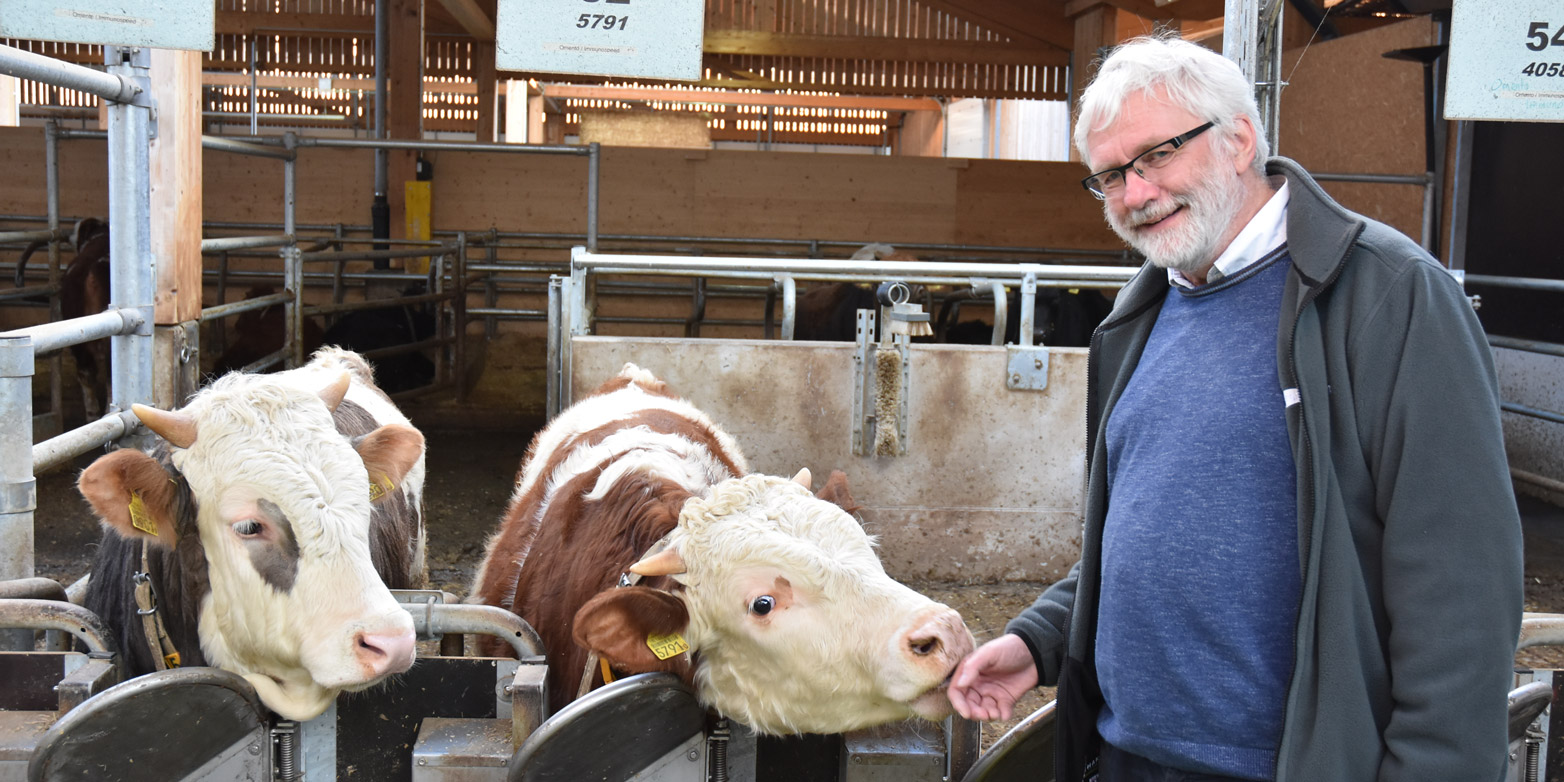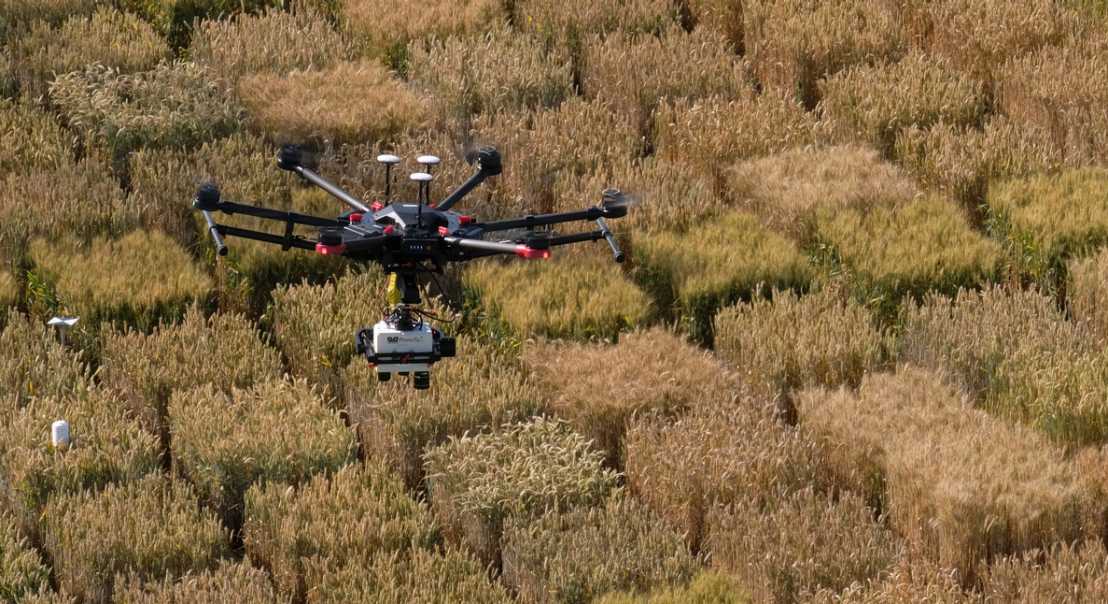The man setting out to reduce methane produced by animals
Michael Kreuzer, Professor of Animal Nutrition and pioneer in the prevention of greenhouse gas emissions from livestock, is retiring after 27 years at ETH Zurich.

Michael Kreuzer, with his white hair and white beard, speaks with an endearing Bavarian accent. He seems relaxed on this hot summer afternoon just a few weeks before his retirement. As he begins to talk, his eyes light up.
A shaky start in Zurich
It all began in 1994 when he moved from University of G?ttingen to ETH Zurich as a young professor of animal nutrition. Michael Kreuzer had already given notice on his house and packed up the moving boxes designed to be moved to Switzerland when he received a fax from his future colleagues indicating that his new post as an ETH professor had been in jeopardy. Everyone in Zurich was worried that the ETH Board would not confirm Kreuzer’s appointment after all.
“Of course, I had no idea what was going on,” Kreuzer recalls. When it became clear that the hold-up was simply a dispute between the supervisory body and the president of ETH, Kreuzer was relieved. “Then things moved forward with my appointment as planned,” he says.
Soon enough, what started out as a nail-biter blossomed into a fruitful partnership for all parties. Kreuzer has been teaching and researching at ETH Zurich in the field of sustainable feeding of livestock, in particular ruminants, pigs and poultry, for 27 years.
The facilities of the research platform AgroVet-Strickhof, which includes a high-altitude site at Alp Weissenstein just below the Albula Pass, are his refuge. This partnership in the field of livestock research between ETH, the University of Zurich and the canton of Zurich was launched in 2017 after more than ten years of planning. Kreuzer was one of its visionaries and was closely involved in the project. The heart of the project is the Metabolic Centre, where research is conducted on the digestion and energy utilisation of livestock.
More climate-friendly cattle
Kreuzer was one of the first scientists to seriously explore the question of how to reduce the emission of the climate-damaging methane from ruminants. Bacteria break down plant fibre in the rumen of cattle, sheep and goats. “A by-product of this is hydrogen, which the animal has to dispose of,” he explains. Primordial methanogenic microbes do this by producing methane from hydrogen and carbon dioxide, which the ruminant then expels through its mouth.
“The aim is to inhibit methane formation without inhibiting digestion of the fibre,” says Kreuzer. He pretty much knows every trick in the book in this respect. His first experiment at ETH was a big moment when he discovered that coconut oil can reduce methane by up to 70 percent. “That was a huge deal at the time,” he chuckles. However, since coconut fat is sourced from the tropics, it is not practical for cows in Switzerland.
Since then, his group has developed a variety of methods to reduce methane. The focus has always been on natural additives to the grassland-based feed normally used in Switzerland. “Switzerland is a grassland country and should require very little additional concentrated feed,” he says. Linseed, which also improves the quality of the milk fat, and hazel leaves, which contain tannins, have proven to be effective in reducing methane. Garlic, on the other hand, achieved little – and smelled terrible. The researchers tested the effectiveness by analysing the gaseous exchange of the animals in special respiration chambers.
From outsider to luminary
Kreuzer’s research initially received little attention. This changed in 2007 when a report published by the International Panel on Climate Change (IPCC) brought the problem of methane from livestock agriculture to the public eye. Since then, the interest in his work has continued to grow. Today, Kreuzer is a highly respected specialist in climate-friendly feeding systems and a sought-after expert by the media.
But it was never his goal to be in the media spotlight. Kreuzer is understated by nature – particularly when talking about himself. He is too modest for that and prefers being with the animals or writing scientific publications.
In his view, the way in which cows are constantly described as climate killers in the media misses the mark: “It’s not cows that are the problem; it’s the people who are raising too many cows.” Today everyone wants quick answers and simple solutions, he says, but it is necessary to approach the problems in a differentiated way.
Considering the system as a whole
Feed additives are not the only thing occupying Kreuzer’s thoughts. As a researcher, he is interested in the diversity of interactions between plants, animals and the environment. This is why he also examines system-oriented questions related to the feeding of animals and the global food supply. “In many countries, the goal is to give livestock more concentrated feed, as replacing fibre with starch reduces methane emissions,” he says. But then feeding animals competes directly with feeding humans, which ultimately may enhance famine, overfertilisation and deforestation. “There are no simple solutions, but this fact is difficult to convey.”
This is why the group is working on research into new types of feeding systems, such as insect protein produced through food waste, that can replace soy in poultry feed. More recently, there have been ethically motivated projects, including dual-purpose chicken types and the fattening of male layer-type chicks – two alternatives to the questionable killing of day-old male chicks hatched in the farming of laying hens. Many of the studies of his group have focused on animal welfare and the quality of meat, milk and eggs.
“Livestock is treated much like electronic gadgets – they are replaced after just a short time, even though they still work well.”Michael Kreuzer
One issue that particularly concerns him is the lifespan of dairy cows, which need two to three years before they can produce milk. The longer they live, the less methane-intensive their milk becomes. “But our cows are living shorter and shorter lives,” Kreuzer explains. This is also because dairy cow meat ends up mainly in burgers, and rising demand from burger chains is driving up the price of the meat, giving farmers an incentive to slaughter their dairy cows earlier. “So livestock is treated much like electronic gadgets – we replace them after just a short time, even though they still work well and keeping them alive would be better for the environment,” says Kreuzer regretfully.
A researcher with a friendly leadership style
Kreuzer studied agriculture at the Technical University of Munich-Weihenstephan and earned his doctoral degree in animal nutrition. He benefited professionally from his doctoral advisor, but struggled with his authoritarian leadership style. “I decided then that in my own future I would do it differently in that regard,” he recalls.
According to his colleagues, he succeeded: Kreuzer is known as a most pleasant colleague, friendly partner and supportive boss, who attaches great importance to humility, integrity and respect for other people.
Farewell lecture
Michael Kreuzer, ETH Professor of Animal Nutrition, will give his farewell lecture Die Schweiz (besser) ohne Nutztiere? (in German) on Wednesday, 22 September 2021, 5.15 p.m. – 7.00 p.m.
More information is available here.
At the most recent spring conference, Kreuzer’s team showed a surprise video of employees, colleagues and partners from all over the world expressing their gratitude with a bit of humour. “This appreciation was very touching,” says Kreuzer. It was also confirmation that his genial style had been the right path.
What comes next remains to be seen
Now the veteran methane-fighter is retiring. He leaves his successor Professor Mutian Niu a legacy of a booming field of research and motivated colleagues. “Industry and other scientists are more eager than ever to collaborate,” says Kreuzer.
A transition period is now beginning for him: he will continue to give his favourite lecture on the quality of animal products for another two semesters. He will also continue to spend days at AgroVet-Strickhof. For the time being, he does not have any grand plans, as his wife will continue to work for another five years: “Then we will have to see, together, what comes next.” At any rate, he plans to acquire a few geese. Or chickens. One thing is certain: “We will stay in Switzerland, as it’s the home base for us and our two adult children.”
